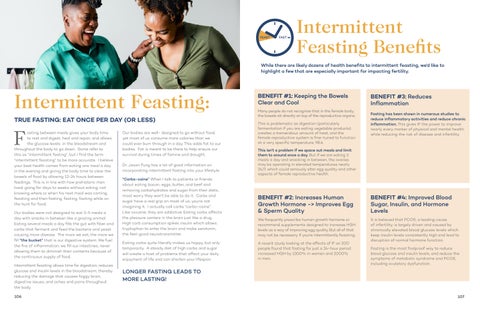FEAST
FAST
Intermittent Feasting Benefits
While there are likely dozens of health benefits to intermittent feasting, we'd like to highlight a few that are especially important for impacting fertility.
Intermittent Feasting: TRUE FASTING: EAT ONCE PER DAY (OR LESS)
F
asting between meals gives your body time to rest and digest, heal and repair, and allows the glucose levels in the bloodstream and throughout the body to go down. Some refer to this as “intermittent fasting”, but I find the term “intermittent feasting” to be more accurate. I believe your best health comes from eating one meal a day in the evening and giving the body time to clear the bowels of food by allowing 12-24 hours between feedings. This is in line with how prehistoric man lived: going for days to weeks without eating, not knowing where or when his next meal was coming, feasting and then fasting, fasting, fasting while on the hunt for food. Our bodies were not designed to eat 3-5 meals a day with snacks in between like a grazing animal. Eating several meals a day fills the gut with fiber and carbs that ferment and feed the bacteria and yeast causing more disease. The more we eat, the more we fill “the bucket” that is our digestive system. We fuel the fire of inflammation; we fill our intestines, never allowing them to diminish their contents because of the continuous supply of food. Intermittent feasting allows time for digestion, reduces glucose and insulin levels in the bloodstream, thereby reducing the damage that causes foggy brain, digestive issues, and aches and pains throughout the body. 106
Our bodies are well- designed to go without food, yet most of us consume more calories than we could ever burn through in a day. This adds fat to our bodies. Fat is meant to be there to help ensure our survival during times of famine and drought. Dr. Jason Fung has a lot of good information on incorporating intermittent fasting into your lifestyle. “Carbo-caine” When I talk to patients or friends about eating bacon, eggs, butter, and beef and removing carbohydrates and sugar from their diets, most worry they won’t be able to do it. Carbs and sugar have a real grip on most of us, you’re not imagining it. I actually call carbs “carbo-caine”. Like cocaine, they are addictive. Eating carbs affects the pleasure centers in the brain just like a drug. High carb consumption spikes insulin which allows tryptophan to enter the brain and make serotonin, the feel-good neurotransmitter. Eating carbs quite literally makes us happy, but only temporarily. A steady diet of high carbs and sugar will create a host of problems that affect your daily enjoyment of life and can shorten your lifespan.
BENEFIT #1: Keeping the Bowels Clear and Cool Many people do not recognize that in the female body, the bowels sit directly on top of the reproductive organs. This is problematic as digestion (particularly fermentation if you are eating vegetable products) creates a tremendous amount of heat, and the female reproductive system is fine-tuned to function at a very specific temperature, 98.6.
BENEFIT #3: Reduces Inflammation Fasting has been shown in numerous studies to reduce inflammatory activities and reduce chronic inflammation. This gives IF the power to improve nearly every marker of physical and mental health while reducing the risk of disease and infertility.
This isn't a problem if we space out meals and limit them to around once a day. But if we are eating 3 meals a day and snacking in between, the ovaries may be operating in elevated temperatures nearly 24/7, which could seriously alter egg quality and other aspects of female reproductive health.
BENEFIT #2: Increases Human Growth Hormone -> Improves Egg & Sperm Quality
BENEFIT #4: Improved Blood Sugar, Insulin, and Hormone Levels
We frequently prescribe human growth hormone or recommend supplements designed to increase HGH levels as a way of improving egg quality. But all of that may not be necessary if you're intermittently feasting.
It is believed that PCOS, a leading cause of infertility, is largely driven and caused by chronically elevated blood glucose levels which keep insulin levels consistently high and lead to disruption of normal hormone function.
A recent study looking at the effects of IF on 200 people found that fasting for just a 24-hour period increased HGH by 1300% in women and 2000% in men.
Fasting is the most foolproof way to reduce blood glucose and insulin levels, and reduce the symptoms of metabolic syndrome and PCOS, including ovulatory dysfunction.
LONGER FASTING LEADS TO MORE LASTING! 107






